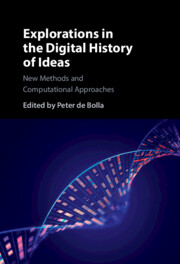Book contents
- Explorations in the Digital History of Ideas
- Explorations in the Digital History of Ideas
- Copyright page
- Contents
- Figures
- Tables
- Contributors
- Acknowledgements
- Part I Computational Methodologies for the History of Ideas
- Part II Case Studies in the Digital History of Ideas
- 4 The Idea of Liberty, 1600–1800
- 5 The Idea of Government in the British Eighteenth Century
- 6 Republicanism in the Founding of America
- 7 Enlightenment Entanglements of Improvement and Growth
- 8 The Idea of Commercial Society: Changing Contexts and Scales
- 9 The Age of Irritability
- 10 On Bubbles and Bubbling: The Idea of ‘The South Sea Bubble’
- 11 Embedded Ideas: Revolutionary Theory and Political Science in the Eighteenth Century
- 12 Computing Koselleck: Modelling Semantic Revolutions, 1720–1960
- Index
9 - The Age of Irritability
from Part II - Case Studies in the Digital History of Ideas
Published online by Cambridge University Press: 09 November 2023
- Explorations in the Digital History of Ideas
- Explorations in the Digital History of Ideas
- Copyright page
- Contents
- Figures
- Tables
- Contributors
- Acknowledgements
- Part I Computational Methodologies for the History of Ideas
- Part II Case Studies in the Digital History of Ideas
- 4 The Idea of Liberty, 1600–1800
- 5 The Idea of Government in the British Eighteenth Century
- 6 Republicanism in the Founding of America
- 7 Enlightenment Entanglements of Improvement and Growth
- 8 The Idea of Commercial Society: Changing Contexts and Scales
- 9 The Age of Irritability
- 10 On Bubbles and Bubbling: The Idea of ‘The South Sea Bubble’
- 11 Embedded Ideas: Revolutionary Theory and Political Science in the Eighteenth Century
- 12 Computing Koselleck: Modelling Semantic Revolutions, 1720–1960
- Index
Summary
This chapter probes the conceptual architecture of irritability in the eighteenth century. It justifies this case study not through a pre-established research agenda but because automated statistical comparisons reveal a marked transformation both in the term itself and in the broader network in which it is embedded. Irritability has long been marginalised in favour of its sister term, sensibility; yet we demonstrate the abiding significance of the former, in a variety of canonical works (Erasmus Darwin, Edmund Burke) and less familiar medical handbooks. This largely overlooked medical discourse infuses broader thinking on gender, colonialism and aesthetics; it worries the distinction between human and non-human life. We conclude by proving that the emergence of the irritability network holds significant consequences for other forms of conceptual thinking. In particular, we show how it affords a rethinking of the notion of habit, and facilitates the transformation of the cultural concept of system from a largely Newtonian and mechanistic notion, at the beginning of the eighteenth century, to an increasingly dynamical and physiological entity.
- Type
- Chapter
- Information
- Explorations in the Digital History of IdeasNew Methods and Computational Approaches, pp. 184 - 205Publisher: Cambridge University PressPrint publication year: 2023



